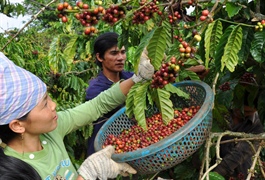EVFTA boosts Viet Nam's rice exports to the EU
EVFTA boosts Viet Nam's rice exports to the EU
Viet Nam's rice exports to Europe continued to grow in the first quarter of 2022, thanks to the Europe-Viet Nam free trade agreement (EVFTA), according to the Ministry of Industry and Trade (MoIT).

In the first quarter, Viet Nam's rice exports reached 1.48 million tonnes, earning US$715 million, up 24 per cent in volume and 10.5 per cent in value on year.
The rice exports to the EU in the first two months of this year recorded an impressive volume of 15,500 tonnes, earning nearly $12 million. The exports rose almost four times in volume and 4.3 times in value compared to 2021.
In the bloc, Italy suddenly took the lead in the import volume of Vietnamese rice with an increase of 26 times over the same period. In addition, there were several other key markets such as Germany, France and the Netherlands.
The export price of Viet Nam's rice to the EU recorded an increase of 9 per cent to $755 per tonne, while Viet Nam's average rice export price fell 12.1 per cent in the first two months of the year to $469 per tonne.
Viet Nam's rice export price to the EU was higher than the average price because the rice exported to this market was mainly aromatic rice with high value. However, Vietnamese export rice has still been unable to compete in price in the EU market against other competitors such as Cambodia, Thailand and India.
According to MoIT, in 2021, despite being affected by the COVID-19 pandemic, Viet Nam's rice exports to the EU reached 60,000 tonnes, worth $41 million. The exports surged by about 1 per cent in volume and more than 20 per cent in value year on year. For the first time, some speciality rice varieties of Viet Nam, such as ST24 and ST25 fragrant rice, were exported to the market.
According to the commitments from EVFTA, the EU gives Viet Nam an export quota of 80,000 tonnes of rice per year to the EU, including 30,000 tonnes of milled rice, 20,000 tonnes of unmilled rice and 30,000 tonnes of aromatic rice. Especially, the EU will not apply a quota for broken rice exported from Viet Nam.
The ministry said Viet Nam could export 100,000 tonnes of all kinds of rice to the EU every year.
Besides, the EU will cut the tariff for rice to zero within 3-5 years from the date of entry into force of the EVFTA. This opens up opportunities for Vietnamese rice to compete with other countries' rice products exported to the EU.
The MoIT representative said that now, businesses have efficiently taken advantage of several incentives from the EVFTA to increase the rice exports to the EU.
According to the Viet Nam Food Association (VFA), in 2022, Viet Nam's rice exports to the EU are expected to increase further, especially as the quality of Vietnamese rice has been improved. However, enterprises exporting Vietnamese rice need to better take advantage of EVFTA.
At present, Viet Nam's rice accounts for only 3.1 per cent of the total amount of rice imported to the EU. This market imports 3-4 million per annum, according to data from the European Statistics Agency (Eurostat).
In 2021, the EU imported 3.6 million tonnes of rice, 1.6 million tonnes were traded within the bloc, and two million tonnes were imported from other countries.
Meanwhile, Viet Nam has not yet met the full rice export quota provided by the EU for 2021, thus still has plenty of room to increase rice exports to this market.
One of the reasons why Viet Nam did not use all rice quotas is that less than 20 per cent of domestic businesses know clearly about the EVFTA, according to Nguyen Thi Thu Trang, director of the WTO and Integration Centre under the VCCI.
According to Trang, besides the advantages of EVFTA, enterprises must also improve the quality of Vietnamese rice and change their measures in approaching the market to expand market share.
With high and stable demand for speciality rice from Asia, the EU will be a potential export market for Vietnamese rice in the future.



























